Abstract
The role of erythropoietin (EP) in polycythemia vera (PV) is controversial, with some experiments suggesting that erythroid progenitors in PV are exquisitely sensitive to EP and EP dependent, and others suggesting that PV progenitors are EP independent. We have examined the characteristics of the EP receptor (EP-R) on erythroid colony-forming cells (ECFC) from patients with PV. In contrast to normal ECFC, which have two classes of EP-R, with 20% showing high affinity (Kd = 0.13 nM; range, 0.04-0.20 nM) and the remainder lower affinity (Kd = 0.37 nM; range, 0.28-0.57 nM), PV ECFC show a single class of 851 low affinity EP-R with Kd = 0.72 nM (range, 0.36-0.85 nM). ECFC from patients with secondary (EP driven) polycythemia or anemia show two classes of EP-R (Kd = 0.18 and 1.10 nM, respectively). Attempts to remove tightly bound EP from putative high affinity EP-R in PV did not reveal any higher affinity receptors. Determination of molecular size by crosslinking showed two proteins of 90 and 100 kD similar to those seen with normal EP-R. These studies indicate the PV ECFC have EP-R that are structurally similar to normal EP-R but lack the higher binding affinity for EP.
Full text
PDF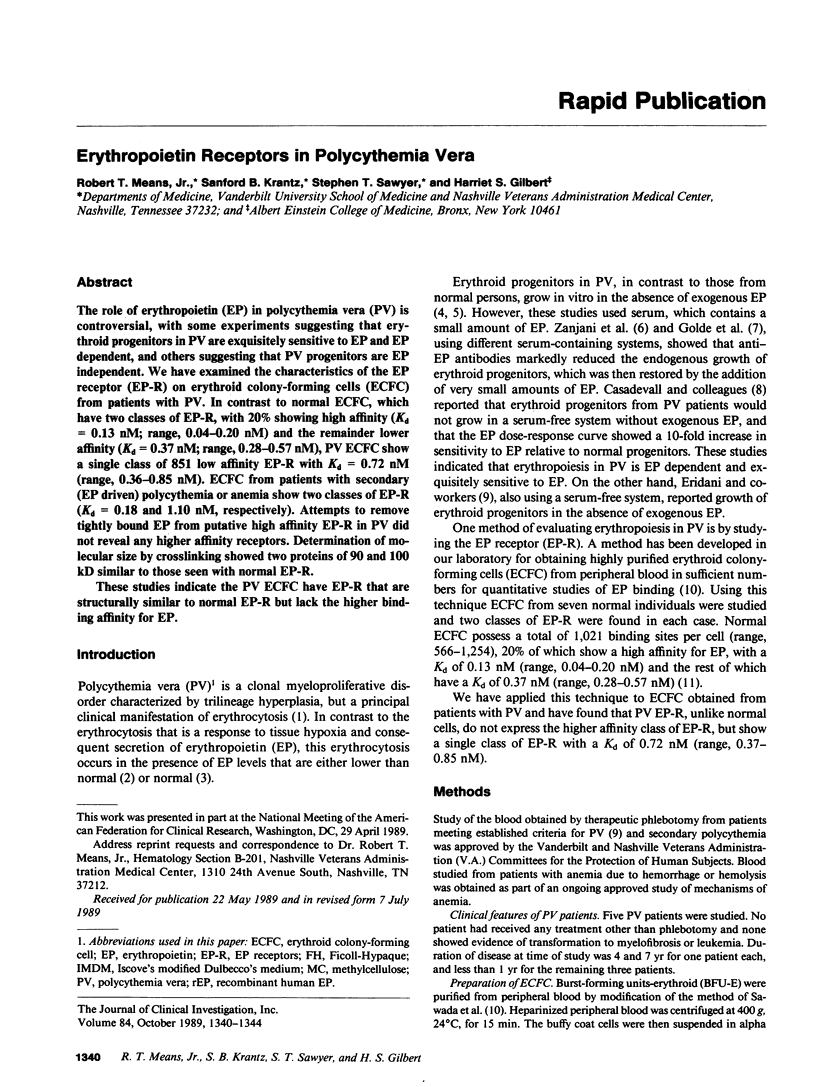
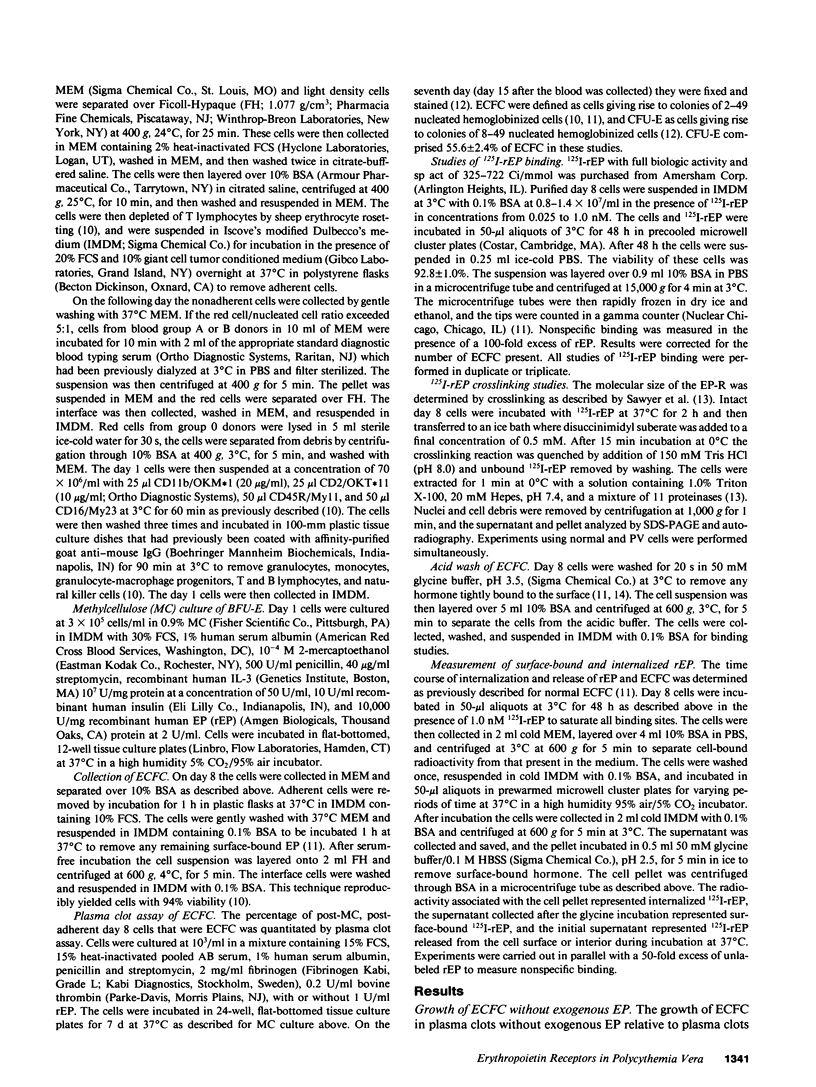
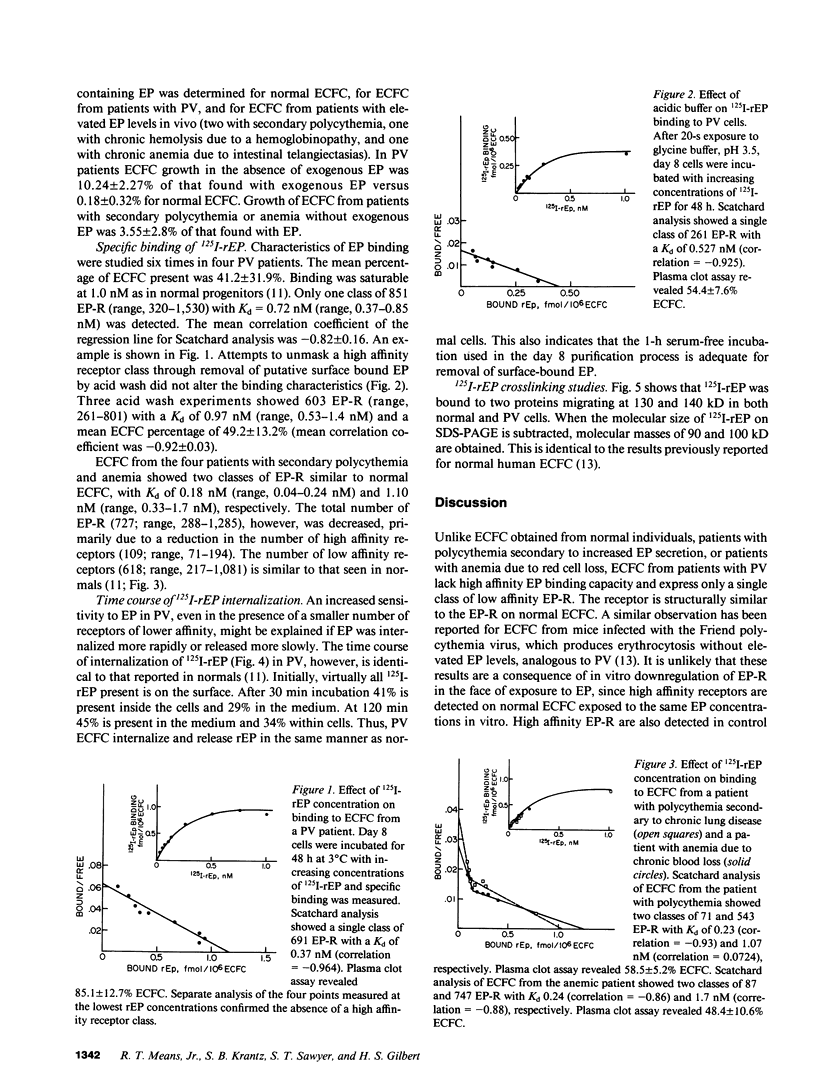
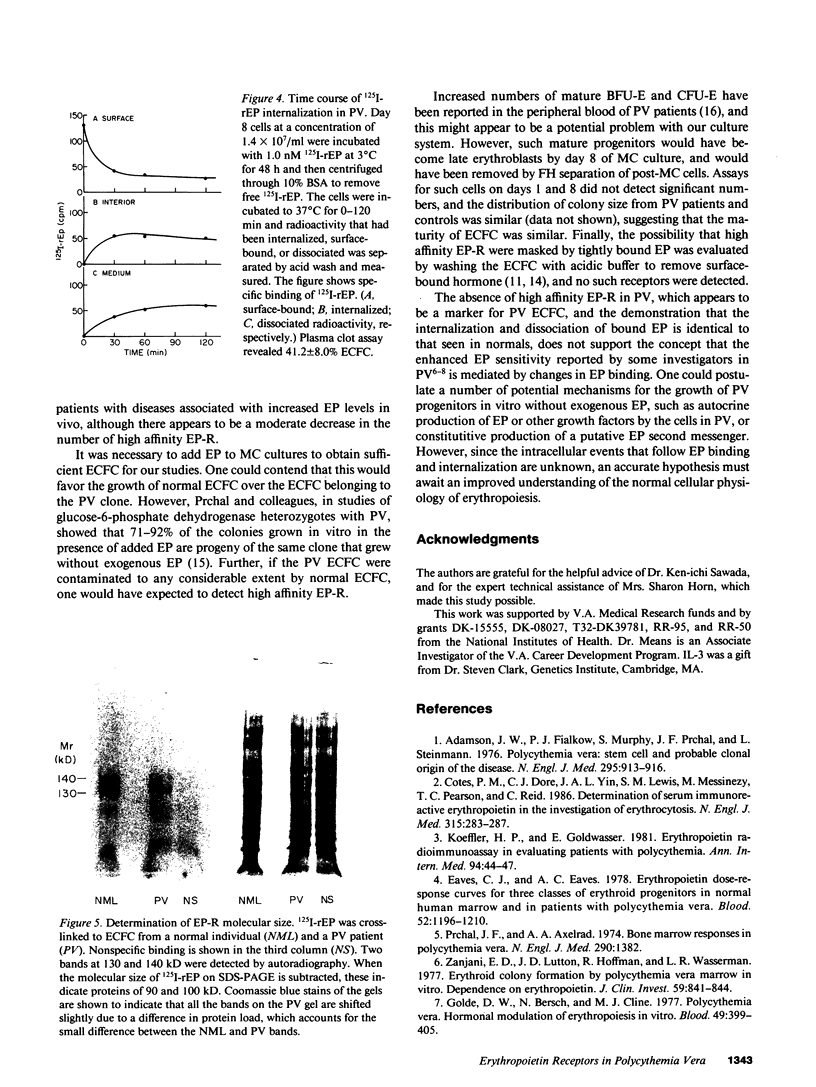
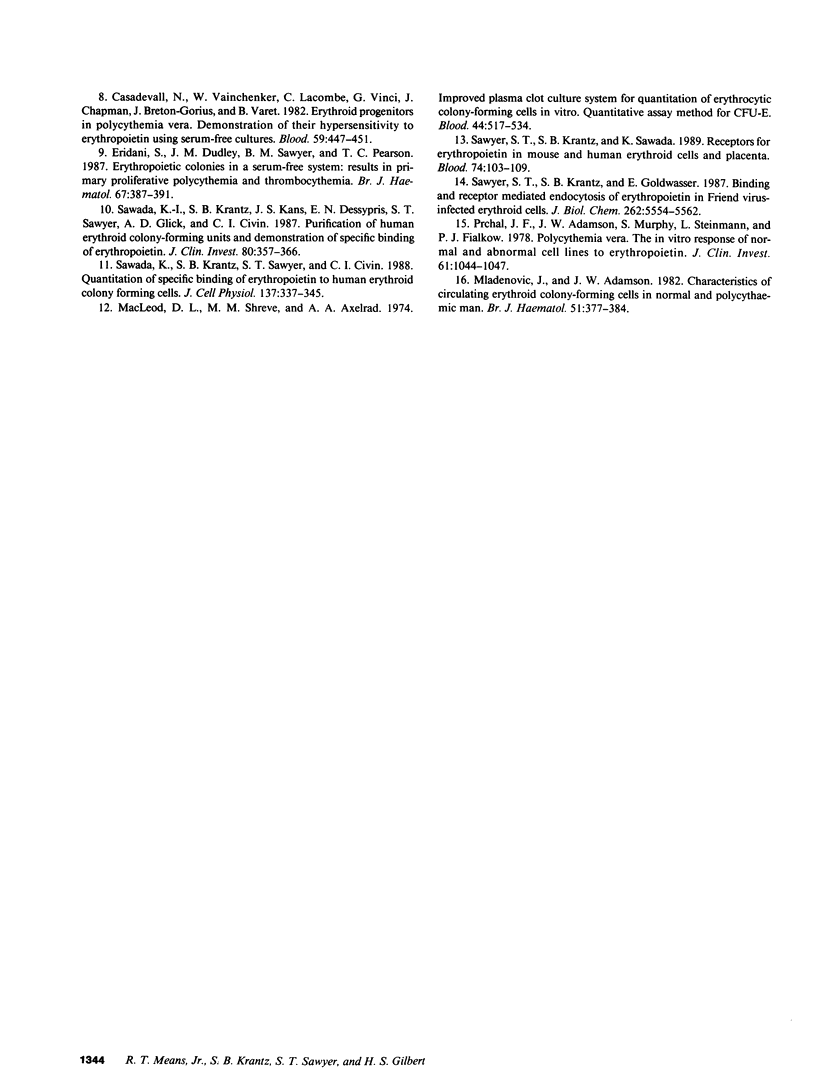
Images in this article
Selected References
These references are in PubMed. This may not be the complete list of references from this article.
- Adamson J. W., Fialkow P. J., Murphy S., Prchal J. F., Steinmann L. Polycythemia vera: stem-cell and probable clonal origin of the disease. N Engl J Med. 1976 Oct 21;295(17):913–916. doi: 10.1056/NEJM197610212951702. [DOI] [PubMed] [Google Scholar]
- Casadevall N., Vainchenker W., Lacombe C., Vinci G., Chapman J., Breton-Gorius J., Varet B. Erythroid progenitors in polycythemia vera: demonstration of their hypersensitivity to erythropoietin using serum free cultures. Blood. 1982 Feb;59(2):447–451. [PubMed] [Google Scholar]
- Cotes P. M., Doré C. J., Yin J. A., Lewis S. M., Messinezy M., Pearson T. C., Reid C. Determination of serum immunoreactive erythropoietin in the investigation of erythrocytosis. N Engl J Med. 1986 Jul 31;315(5):283–287. doi: 10.1056/NEJM198607313150503. [DOI] [PubMed] [Google Scholar]
- Eaves C. J., Eaves A. C. Erythropoietin (Ep) dose-response curves for three classes of erythroid progenitors in normal human marrow and in patients with polycythemia vera. Blood. 1978 Dec;52(6):1196–1210. [PubMed] [Google Scholar]
- Eridani S., Dudley J. M., Sawyer B. M., Pearson T. C. Erythropoietic colonies in a serum-free system: results in primary proliferative polycythaemia and thrombocythaemia. Br J Haematol. 1987 Dec;67(4):387–391. doi: 10.1111/j.1365-2141.1987.tb06158.x. [DOI] [PubMed] [Google Scholar]
- Golde D. W., Bersch N., Cline M. J. Polycythemia vera: hormonal modulation of erythropoiesis in vitro. Blood. 1977 Mar;49(3):399–405. [PubMed] [Google Scholar]
- Koeffler H. P., Goldwasser E. Erythropoietin radioimmunoassay in evaluating patients with polycythemia. Ann Intern Med. 1981 Jan;94(1):44–47. doi: 10.7326/0003-4819-94-1-44. [DOI] [PubMed] [Google Scholar]
- McLeod D. L., Shreeve M. M., Axelrad A. A. Improved plasma culture system for production of erythrocytic colonies in vitro: quantitative assay method for CFU-E. Blood. 1974 Oct;44(4):517–534. [PubMed] [Google Scholar]
- Mladenovic J., Adamson J. W. Characteristics of circulating erythroid colony-forming cells in normal and polycythaemic man. Br J Haematol. 1982 Jul;51(3):377–384. doi: 10.1111/j.1365-2141.1982.tb02792.x. [DOI] [PubMed] [Google Scholar]
- Prchal J. F., Adamson J. W., Murphy S., Steinmann L., Fialkow P. J. Polycythemia vera. The in vitro response of normal and abnormal stem cell lines to erythropoietin. J Clin Invest. 1978 Apr;61(4):1044–1047. doi: 10.1172/JCI109003. [DOI] [PMC free article] [PubMed] [Google Scholar]
- Prchal J. F., Axelrad A. A. Letter: Bone-marrow responses in polycythemia vera. N Engl J Med. 1974 Jun 13;290(24):1382–1382. doi: 10.1056/nejm197406132902419. [DOI] [PubMed] [Google Scholar]
- Sawada K., Krantz S. B., Kans J. S., Dessypris E. N., Sawyer S., Glick A. D., Civin C. I. Purification of human erythroid colony-forming units and demonstration of specific binding of erythropoietin. J Clin Invest. 1987 Aug;80(2):357–366. doi: 10.1172/JCI113080. [DOI] [PMC free article] [PubMed] [Google Scholar]
- Sawada K., Krantz S. B., Sawyer S. T., Civin C. I. Quantitation of specific binding of erythropoietin to human erythroid colony-forming cells. J Cell Physiol. 1988 Nov;137(2):337–345. doi: 10.1002/jcp.1041370218. [DOI] [PubMed] [Google Scholar]
- Sawyer S. T., Krantz S. B., Goldwasser E. Binding and receptor-mediated endocytosis of erythropoietin in Friend virus-infected erythroid cells. J Biol Chem. 1987 Apr 25;262(12):5554–5562. [PubMed] [Google Scholar]
- Sawyer S. T., Krantz S. B., Sawada K. Receptors for erythropoietin in mouse and human erythroid cells and placenta. Blood. 1989 Jul;74(1):103–109. [PubMed] [Google Scholar]
- Zanjani E. D., Lutton J. D., Hoffman R., Wasserman L. R. Erythroid colony formation by polycythemia vera bone marrow in vitro. Dependence on erythropoietin. J Clin Invest. 1977 May;59(5):841–848. doi: 10.1172/JCI108706. [DOI] [PMC free article] [PubMed] [Google Scholar]



